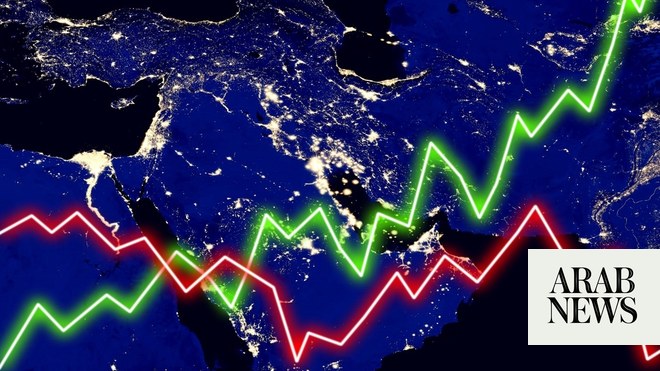
When the Saudi-UAE Coordination Council met in Jeddah in June, it reiterated its two main goals: Enhancing economic welfare internally and countering threats to Gulf and Arab security. It also stressed that its work is consistent with Gulf Cooperation Council objectives. Some critics have raised doubts and I will try to put those concerns to rest.
Consider the first goal. The two countries are a formidable pair: They represent the two largest GCC economies, and indeed the two largest Arab economies. Their combined GDP is about $1.1 trillion, equal to about 70 percent of GCC GDP and 43 percent of the combined economies of the 22 members of the Arab League. By way of comparison, Saudi-UAE GDP is equal to 50 percent of the combined GDP of the 54 countries of the African continent. The two countries already have thriving economies, generous welfare systems, and ambitious diversification programs. They have well-educated, mostly young populations. In partnership, Saudi Arabia and the UAE could do more to carry out fundamental transformations from a dependence on natural resources to more diversified and viable economies. And they could do it faster.
The Saudi-Emirati strategic partnership is not just the sum of the two countries’ capabilities but, through creative synergies, it could produce more than their arithmetic total in most areas, including the economy and security.
The first step toward this partnership was taken in Abu Dhabi in May 2014, when a meeting was held between Abu Dhabi’s Crown Prince Sheikh Mohammed bin Zayed, who is also the deputy supreme commander of the UAE’s armed forces, and the late Saudi Foreign Minister Prince Saud Al-Faisal. A “joint high committee” was set up, chaired by the two officials. The two countries announced their commitment to confronting regional challenges “anchored on a strong cohesive structure,” and vowed to “enhance strategic relations between the two countries in all areas.”
In May 2016, the Saudi-UAE Coordination Council was set up and its formation was enshrined into law in the two countries over the ensuing 18 months. The council is headed by Crown Prince Mohammed bin Salman and Sheikh Mohammed. The first meeting in Jeddah in June 2018 announced the establishment of a “strategic partnership” in all areas.
The Saudi Arabia-UAE strategic partnership is not just the sum of the two countries’ capabilities, but could produce more in most areas, including the economy and security.
Abdel Aziz Aluwaisheg
The twin objectives of security and economic growth were also spelled out in more detail. On security, the council aims at achieving full integration between the two countries, politically and militarily, to preserve Gulf security and work toward the security of all Arab countries. The economic partnership includes developing a joint vision toward full economic integration, innovative and optimal use of their resources, and effective and integrated educational systems.
Implementation and monitoring mechanisms were set up and 32 ministers will take part in the implementation process through various committees that deal with specific areas of the partnership.
Despite the two countries stressing that their partnership derives from the GCC system and its objectives are consistent with those of the GCC, some observers have claimed that the Saudi-UAE Coordination Council could undermine the GCC, and even replace it.
But, in fact, the GCC permits the formation of such bilateral arrangements and has encouraged them at times. For practical reasons, the GCC allows its member states to work in various formations, not just the six members as a whole. For example, to speed up implementation, the GCC power grid integration started with only four countries, with the remaining two joining later. Similarly, when the GCC decided to drop the use of passports for travel between member states, the system was introduced bilaterally first. Also, the GCC monetary council is now composed of only four countries.
In 2006, the GCC provided a general rule for member states to enter into integration arrangements that go beyond the minimum benchmark set by the GCC as a group. In December 2015, the GCC adopted a new directive that explicitly encouraged member states to go for greater integration steps, bilaterally or multilaterally, that go beyond the minimum standards set by the GCC. The rule is that the goals of such integration steps should be consistent with those of the GCC and should aim at greater integration than that provided for by the GCC when acting in full.
In fact, the objectives of the Saudi-UAE partnership and the GCC are quite similar. Article 4 of the GCC Charter states its objectives as “coordination, integration and connectivity between member states in all fields leading to unity between them.” That and most of the fields listed in Article 4 are consistent with the stated goals of the Saudi-UAE partnership.
Having settled the question of consistency with the GCC system, what could the Saudi-UAE partnership do to further the goals of the organization? In fact, there are many steps that the two countries could take to set new benchmarks for the GCC that go beyond what has been agreed by its full membership.
Take the GCC internal integration projects, such as the customs union, the common market, the railroad network, and the unified GCC tourist visa. There are steps that could be taken to speed up the completion of those projects. Similarly, the two countries could take joint steps to complete the banking union and the integration of financial markets between them as a first step.
Similar steps could be taken by the two countries in coordination with like-minded members to meet the formidable regional challenges that require speedy action.
Thus the Saudi-UAE Strategic Partnership could in fact promote and strengthen the GCC, so long as the objectives of the partnership are consistent with those of the GCC — something that the two countries have stressed throughout.
Abdel Aziz Aluwaisheg is the GCC Assistant Secretary-General for Political Affairs & Negotiation, and a columnist for Arab News. The views expressed in this piece are personal and do not necessarily represent GCC views. Twitter: @abuhamad1
Disclaimer: Views expressed by writers in this section are their own and do not necessarily reflect Arab News" point-of-view









